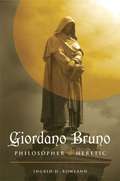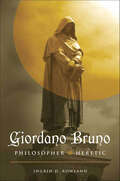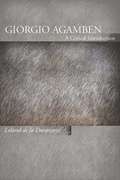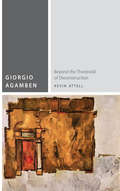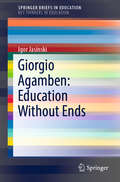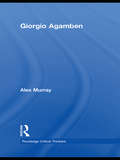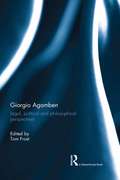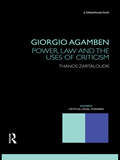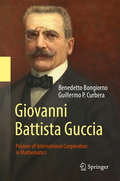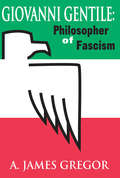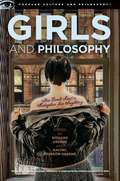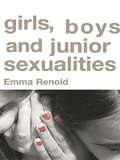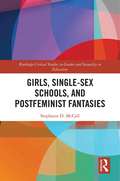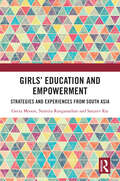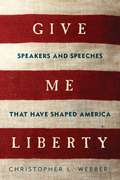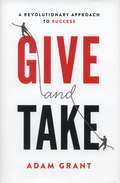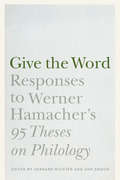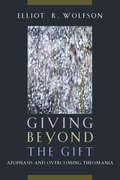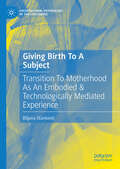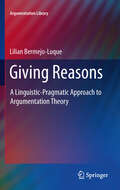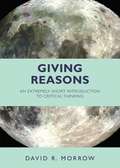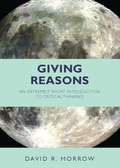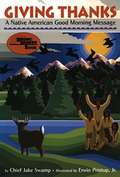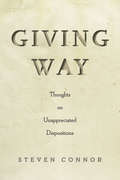- Table View
- List View
Giordano Bruno: Philosopher / Heretic
by Ingrid D. RowlandGiordano Bruno is one of the great figures of early modern Europe, and one of the least understood. Ingrid D. Rowland's pathbreaking life of Bruno establishes him once and for all as a peer of Erasmus, Shakespeare, and Galileo, a thinker whose vision of the world prefigures ours. By the time Bruno was burned at the stake as a heretic in 1600 on Rome's Campo dei Fiori, he had taught in Naples, Rome, Venice, Geneva, France, England, Germany, and the & magic Prague of Emperor Rudolph II. His powers of memory and his provocative ideas about the infinity of the universe had attracted the attention of the pope, Queen Elizabeth--and the Inquisition, which condemned him to death in Rome as part of a year long jubilee. Writing with great verve and sympathy for her protagonist, Rowland traces Bruno's wanderings through a sixteenth-century Europe where every certainty of religion and philosophy had been called into question and shows him valiantly defending his ideas (and his right to maintain them) to the very end. An incisive, independent thinker just when natural philosophy was transformed into modern science, he was also a writer of sublime talent. His eloquence and his courage inspired thinkers across Europe, finding expression in the work of Shakespeare and Galileo. Giordano Bruno allows us to encounter a legendary European figure as if for the first time.
Giordano Bruno: Philosopher/Heretic
by Ingrid D. Rowland“Ingrid D. Rowland brings before us today the pieces of an extraordinary sixteenth-century life . . . This is intellectual biography at its best.” —Peter N. Miller, The New RepublicGiordano Bruno is one of the great figures of early modern Europe, and one of the least understood. Ingrid D. Rowland's pathbreaking life of Bruno establishes him once and for all as a peer of Erasmus, Shakespeare, and Galileo, a thinker whose vision of the world prefigures ours.By the time Bruno was burned at the stake as a heretic in 1600 on Rome's Campo dei Fiori, he had taught in Naples, Rome, Venice, Geneva, France, England, Germany, and the “magic Prague” of Emperor Rudolph II. His powers of memory and his provocative ideas about the infinity of the universe had attracted the attention of the pope, Queen Elizabeth—and the Inquisition, which condemned him to death in Rome as part of a yearlong jubilee.Writing with great verve and sympathy for her protagonist, Rowland traces Bruno's wanderings through a sixteenth-century Europe where every certainty of religion and philosophy had been called into question and shows him valiantly defending his ideas (and his right to maintain them) to the very end. An incisive, independent thinker just when natural philosophy was transformed into modern science, he was also a writer of sublime talent. His eloquence and his courage inspired thinkers across Europe, finding expression in the work of Shakespeare and Galileo.Giordano Bruno allows us to encounter a legendary European figure as if for the first time.“A loving and thoughtful account of [Bruno’s] life and thought, satires and sonnets, dialogues and lesson plans, vagabond days and star-spangled nights.” —John Leonard, Harper’s
Giorgio Agamben
by Leland de la DurantayeGiorgio Agamben is a philosopher well known for his brilliance and erudition, as well as for the difficulty and diversity of his seventeen books. The interest which hisHomo Sacersparked in America is likely to continue to grow for a great many years to come. Giorgio Agamben: A Critical Introductionpresents the complexity and continuity of Agamben's philosophy-and does so for two separate and distinct audiences. It attempts to provide readers possessing little or no familiarity with Agamben's writings with points of entry for exploring them. For those already well acquainted with Agamben's thought, it offers a critical analysis of the achievements that have marked it.
Giorgio Agamben: Beyond the Threshold of Deconstruction (Commonalities)
by Kevin AttellAgamben’s thought has been viewed as descending primarily from the work of Heidegger, Benjamin, and, more recently, Foucault. This book complicates and expands that constellation by showing how throughout his career Agamben has consistently and closely engaged (critically, sympathetically, polemically, and often implicitly) the work of Derrida as his chief contemporary interlocutor.The book begins by examining the development of Agamben’s key concepts—infancy, Voice, potentiality—from the 1960s to approximately 1990 and shows how these concepts consistently draw on and respond to specific texts and concepts of Derrida. The second part examines the political turn in Agamben’s and Derrida’s thinking from about 1990 onward, beginning with their investigations of sovereignty and violence and moving through their parallel treatments of juridical power, the relation between humans and animals, and finally messianism and the politics to come.
Giorgio Agamben: Education Without Ends (SpringerBriefs in Education)
by Igor JasinskiItalian critical theorist Giorgio Agamben may be best known for his political writings concerning the curtailing of privacy rights in the wake of 9/11 and the status of prisoners of war and refugees. Yet, casting him primarily as a political theorist is misleading given his significant contributions to the fields of linguistics, literary theory, philosophy, aesthetics, and religious studies. This book provides the first ever comprehensive introduction to Agamben’s work as it pertains to the field of education. Written in a clear and accessible style, Giorgio Agamben: Education without Ends is an invaluable resource for anyone interested in thinking education beyond its current standardized forms.The first part of the book creates a context by highlighting formative experiences in Agamben’s biography that reflect a particular idea of education on the threshold between life and work. The second part introduces the notions of infancy, study, community, and happiness, and discusses their relevance with regard to key issues in educational theory and practice. The third part shows how conceptual constellations based on Agamben’s work can inspire studious practices within the spatial, temporal, and curricular infrastructure of educational institutions as they exist today.
Giorgio Agamben: Law, Literature, Life (Routledge Critical Thinkers)
by Alex MurrayGiorgio Agamben is one of the most important and controversial figures in contemporary continental philosophy and critical theory. His work covers a broad array of topics from biblical criticism to Guantanamo Bay and the ‘war on terror’. Alex Murray explains Agamben’s key ideas, including: an overview of his work from first publication to the present clear analysis of Agamben’s philosophy of language and life theories of ethics and ‘witnessing’ the relationship between Agamben’s political writing and his work on aesthetics and poetics. Investigating the relationship between politics, language, literature, aesthetics and ethics, this guide is essential reading for anyone wishing to understand the complex nature of modern political and cultural formations.
Giorgio Agamben: Legal, Political and Philosophical Perspectives
by Tom FrostThis book collects new contributions from an international group of leading scholars – including many who have worked closely with Agamben – to consider the impact of Agamben’s thought on research in the humanities and social sciences. Giorgio Agamben: Legal, Political and Philosophical Perspectives addresses the potential of Agamben’s thought by re-focusing attention away from his critiques of Western politics and towards his scheme for a political future. Part I of the book draws upon a wide range of issues such as legal oaths, legal reasoning and Christian conceptions of love in order to examine the potential for Agamben’s work to impact upon future legal scholarship. Part II focuses on political perspectives that include references to Marx, Rousseau and Agamben’s conception of the ‘messianic’. Theology, biology, and the thought of Gilles Deleuze, Walter Benjamin and Antonin Artaud are all drawn upon in Part III to explore philosophical perspectives in Agamben’s thought. This book demonstrates the importance and originality of Giorgio Agamben, who has articulated a vision of politics that must be recognised as an influential contribution to modern philosophical and political thinking. It is a book that will be of considerable interest to many working across the humanities and social sciences.
Giorgio Agamben: Power, Law and the Uses of Criticism (Nomikoi: Critical Legal Thinkers)
by Thanos ZartaloudisGiorgio Agamben: Power, Law and the Uses of Criticism is a thorough engagement with the thought of the influential Italian philosopher Giorgio Agamben. It explores Agamben’s work on language, ontology, power, law and criticism from the 1970s to his most recent publications. Introducing Agamben's work to a readership in legal theory, as well as in the humanities and social sciences more generally, Thanos Zartaloudis argues that an adequate understanding of Agamben's Homo Sacer project requires an attention to his earlier philosophical writings on language, ontology, power and time. It is through this attentive and creative analysis of Agamben's work that Zartaloudis here presents a rethinking of the ideas of justice and criticism.
Giovanni Battista Guccia: Pioneer of International Cooperation in Mathematics
by Benedetto Bongiorno Guillermo P. CurberaThis book examines the life and work of mathematician Giovanni Battista Guccia, founder of the Circolo Matematico di Palermo and its renowned journal, the Rendiconti del Circolo matematico di Palermo. The authors describe how Guccia, an Italian geometer, was able to establish a mathematical society in Sicily in the late nineteenth century, which by 1914 would grow to become the largest and most international in the world, with one of the most influential journals of the time. The book highlights the challenges faced by Guccia in creating an international society in isolated Palermo, and places Guccia’s activities in the wider European context through comparisons with the formation of the London Mathematical Society and the creation of Mittag-Leffler’s Acta Mathematica in Stockholm. Based on extensive searches in European archives, this scholarly work follows both historical and scientific treads, and will appeal to those interested in the history of mathematics and science in general.
Giovanni Gentile: Philosopher of Fascism
by A. James GregorThe recent rise in Europe of extreme right-wing political parties along with outbreaks of violent nationalist fervor in the former communist bloc has occasioned much speculation on a possible resurgence of fascism. At the polemical level, fascism has become a generic term applied to virtually any form of real or potential violence, while among Marxist and left-wing scholars discredited interpretations of fascism as a "product of late capitalism" are revived. Empty of cognitive significance, these formulas disregard the historical and philosophical roots of fascism as it arose in Italy and spread throughout Europe. In Giovanni Gentile: Philosopher of Fascism, A. James Gregor returns to those roots by examining the thought of Italian Fascism's major theorist.In Gregor's reading of Gentile, fascism was-and remains-an anti-democratic reaction to what were seen to be the domination by advanced industrial democracies of less-developed or status-deprived communities and nations languishing on the margins of the "Great Powers." Sketching in the political background of late nineteenth-century Italy, industrially backward and only recently unified, Gregor shows how Gentile supplied fascism its justificatory rationale as a developmental dictatorship. Gentile's Actualism (as his philosophy came to be identified) absorbed many intellectual currents of the early twentieth century including nationalism, syndicalism, and futurism and united them in a dynamic rebellion against new perceived hegemonic impostures of imperialism. The individual was called to an idealistic ethic of obedience, work, self-sacrifice, and national community. As Gregor demonstrates, it was a paradigm of what we can expect in the twenty-first century's response, on the part of marginal nations, to the globalization of the industrialized democracies. Gregor cites post-Maoist China, nationalist Russia, Africa, and the Balkans at the development stage from which fascism could grow.The f
Girls and Philosophy
by Richard Greene Rachel Robison-GreeneThe drama-comedy show Girls-often under-rated by being perceived as Sex and the City for the Millennial generation-has made TV history and provoked controversy for its pitilessly accurate portrayal of four oddly sympathetic twenty-something female characters, notable for their self-absorption, empathy deficits, and ineptitude with relationships. Among other breakthroughs, it is the first show to depict the sex act among the alienated young as nearly always awkward and unfulfilling. In Girls and Philosophy, a team of diverse yet always sensitive, empathic, and ept philosophers approach the world of Girls from a variety of angles and philosophical points of view. Underlying this New York world is the new reality of ambitious yet unfocused young people from comparatively advantaged backgrounds having their expectations chilled by the severe and prolonged economic recession. The writers attack many fascinating issues arising from Girls, including the meaning of authenticity in the twenty-first century, coming of age in a society with no clear guidelines for most of what matters in life,Girls as the only TV show the pop-culture-hating professor Theodor Adorno might have admired, feminist appraisals of these not-very-feminist characters and their frustrations, what the wardrobes of the four mean philosophically, how each of the four deals with the anxiety that comes from inescapable freedom, whether we need to amend the traditional list of seven deadly sins in the context of present-day New York, how the speech of the Millennials illustrates Austin's theory of speech acts, how the learning of Hannah, Shoshanna, Jessa, and Marnie compares with the ancient Greek theory of the education of the young, and of course, why we once again find it natural to think of women in their early- to mid-twenties as 'girls'.
Girls, Boys and Junior Sexualities: Exploring Childrens' Gender and Sexual Relations in the Primary School
by Emma RenoldGirls, Boys and Junior Sexualities takes an insightful and in-depth look at the hidden worlds of young children's sexualities. Based upon extensive group interviews and observation, the author illustrates how sexuality is embedded in children's school-based cultures and gender identities. From examining children's own views and experiences, the book explores a range of topical and sensitive issues, including how: the primary school is a key social arena for 'doing' sexuality sexuality shapes children's friendships and peer relations being a 'proper' girl or boy involves investing in a heterosexual identity children use gendered or sexual insults to maintain gender and sexual norms. Grounded in children's real-life experiences, this book traces their struggles, anxieties, desires and pleasures as they make sense of their emerging sexualities. It also includes frank and open discussions of the pressures of compulsory heterosexuality, the boyfriend/girlfriend culture, misogyny and sexual harassment.Girls, Boys and Junior Sexualities is a timely and powerful resource for researchers, educationalists and students in childhood studies, sociology and psychology and will be of great interest to professionals and policy makers working with young children.
Girls, Single-Sex Schools, and Postfeminist Fantasies (Routledge Critical Studies in Gender and Sexuality in Education)
by Stephanie D. McCallBringing together feminist theory, girlhood studies, and curriculum theory, this book contributes an in-depth critical analysis of curriculum in single-gender schooling for girls in postfeminist landscapes of "unlimited choices" and resurgences of proper girlhood. The arguments challenge the mainstream assumptions and promotions about the guarantees of female success via small school supports, tailored curricula, protection, school choice and class advantage. Single-gender schools are not homogenous; they have different histories, student populations, finances and organization. Recognizing this diversity, Girls, Single-sex Schools, and Postfeminist Fantasies draws on rich data collected in two US secondary schools over a two-year period to identify and explore the ambiguities of success in single-sex schools for girls. Rich classroom observations and interviews with teachers and students reveal the resounding message delivered to girls - that they can "have it all" by going to college. By exploring students’ imaginings, hopes, and doubts around college, the text illustrates how this catalyzes girls’ critiques of their futures and of the schooled storylines of female success. While teachers might trumpet college, career, and limitless horizons, girls seek to understand their social positions and try to make sense of family, passions, and future happiness. This book will be of great interest to graduate and postgraduate students, academics, researchers, libraries in secondary education, girlhood studies, sociology of education, gender and sexuality in education, single-sex schooling, and feminist theory.
Girls’ Education and Empowerment: Strategies and Experiences from South Asia
by Geeta Menon Namita Ranganathan Sanjeev RaiThe book builds an understanding on the issue of girls’ education and empowerment in the backdrop of a broad geographic canvas of countries in South Asia. Using select education and gender-related indicators and qualitative data, it presents the status of girls’ education across these countries. It proceeds to explore the dominant structural, systemic, situational, and macro- and micro-level inter-related barriers to girls’ education. Country-specific situational issues like economic crises, political instability, natural disasters, and conflict that impact girls’ lives and education are underscored for contextual understanding. Within this landscape, the impact of COVID-19 on girls’ education has also been discussed. The book’s uniqueness lies in its approach to linking praxis with theory by distilling the fundamental principles and assumptions underlying the strategies, using these for theorizing and generating discourse in the field. The attempts to theorize are multidisciplinary in nature as they draw from the disciplines of Sociology, Psychology, Education, Development Studies, Conflict Studies, and Gender Studies.This book would be useful to the students, researchers, and teachers working in the fields of Education, Development Studies, Gender Studies, Social Work, Sociology, and Psychology. It would also be an invaluable companion to policymakers and professionals from government and non-government organizations working in the fields of Education, Social Development, and Gender.
Give Me Liberty: Speakers and Speeches that Have Shaped America
by Christopher L. WebberSure to become a classic of American oratorical history, ?Give Me Liberty reveals the enduring power of America's quest for a freer and more just society, and the context of the speeches and speakers--from Daniel Webster and Patrick Henry to Martin Luther King and Ronald Reagan--that gave voice to the struggle. ? "Give me liberty," demanded Patrick Henry, "or give me death!" Henry's words continue to echo in American history and that quote, and the speech it comes from, remains one of the two or three known to almost every American. The other speeches that have become part of our American collective consciousness all have one theme in common: liberty. These feats of oration seem to trace the evolution of America's definition of liberty, and who it applies to. But what exact is liberty? It is a term open to a broad range of opinion, and questions about freedom arise daily in the news and in everyday life. Perhaps uniquely among the nations of the world, the United States traces its origins to groups and individuals who specifically wanted create something new. Webber's insightful Give Me Liberty looks at these great speeches and provides the historical context, focusing attention on particular individuals who summed up the issues of their own day in words that have never been forgotten. Webber gleans lessons from the past centuries that will allow us to continue to strive for the ideals of liberty in the 21st century.
Give War and Peace a Chance: Tolstoyan Wisdom for Troubled Times
by Andrew D. Kaufman“This lively appreciation of one of the most intimidating and massive novels ever written should persuade many hesitant readers to try scaling the heights of War and Peace sooner rather than later” (Publishers Weekly).Considered by many critics the greatest novel ever written, War and Peace is also one of the most feared. And at 1,500 pages, it’s no wonder why. Still, in July 2009 Newsweek put War and Peace at the top of its list of 100 great novels and a 2007 edition of the AARP Bulletin included the novel in their list of the top four books everybody should read by the age of fifty. A New York Times survey from 2009 identified War and Peace as the world classic you’re most likely to find people reading on their subway commute to work. What might all those Newsweek devotees, senior citizens, and harried commuters see in a book about the Napoleonic Wars in the early 1800s? War and Peace is many things. It is a love story, a family saga, a war novel. But at its core it’s a novel about human beings attempting to create a meaningful life for themselves in a country torn apart by war, social change, political intrigue, and spiritual confusion. It is a mirror of our times. Give War and Peace a Chance takes readers on a journey through War and Peace that reframes their very understanding of what it means to live through troubled times and survive them. Touching on a broad range of topics, from courage to romance, parenting to death, Kaufman demonstrates how Tolstoy’s wisdom can help us live fuller, more meaningful lives. The ideal companion to War and Peace, this book “makes Tolstoy’s characters lively and palpable…and may well persuade readers to finally dive into one of the world’s most acclaimed—and daunting—novels” (Kirkus Reviews).
Give and Take: A Revolutionary Approach to Success
by Adam M. GrantAn innovative, groundbreaking book that will captivate readers of Malcolm Gladwell, Daniel Pink, The Power of Habit, and Quiet. For generations, we have focused on the individual drivers of success: passion, hard work, talent, and luck. But today, success is increasingly dependent on how we interact with others. It turns out that at work, most people operate as either takers, matchers, or givers. Whereas takers strive to get as much as possible from others and matchers aim to trade evenly, givers are the rare breed of people who contribute to others without expecting anything in return. Using his own pioneering research as Wharton's youngest tenured professor, Grant that shows these styles have a surprising impact on success. Although some givers get exploited and burn out, the rest achieve extraordinary results across a wide range of industries. Combining cutting-edge evidence with captivating stories, this landmark book shows how one of America's best networkers developed his connections, why the creative genius behind one of the most popular shows in television history toiled for years in anonymity, how a basketball executive responsible for multiple draft busts transformed his franchise into a winner, and how we could have anticipated Enron's demise four years before the company collapsed--without ever looking at a single number. Praised by bestselling authors such as Dan Pink, Tony Hsieh, Dan Ariely, Susan Cain, Dan Gilbert, Gretchen Rubin, Bob Sutton, David Allen, Robert Cialdini, and Seth Godin--as well as senior leaders from Google, McKinsey, Merck, Estée Lauder, Nike, and NASA-- Give and Take highlights what effective networking, collaboration, influence, negotiation, and leadership skills have in common. This landmark book opens up an approach to success that has the power to transform not just individuals and groups, but entire organizations and communities.
Give the Word: Responses to Werner Hamacher's "95 Theses on Philology" (Stages)
by Werner HamacherWerner Hamacher’s witty and elliptical 95 Theses on Philology challenges the humanities—and particularly academic philology—that assume language to be a given entity rather than an event. In Give the Word eleven scholars of literature and philosophy (Susan Bernstein, Michèle Cohen-Halimi, Peter Fenves, Sean Gurd, Daniel Heller-Roazen, Jan Plug, Gerhard Richter, Avital Ronell, Thomas Schestag, Ann Smock, and Vincent van Gerven Oei) take up the challenge presented by Hamacher’s theses. At the close Hamacher responds to them in a spirited text that elaborates on the context of his 95 Theses and its rich theoretical and philosophical ramifications. The 95 Theses, included in this volume, makes this collection a rich resource for the study and practice of “radical philology.” Hamacher’s philology interrupts and transforms, parting with tradition precisely in order to remain faithful to its radical but increasingly occluded core. The contributors test Hamacher’s break with philology in a variety of ways, attempting a philological practice that does not take language as an object of knowledge, study, or even love. Thus, in responding to Hamacher’s Theses, the authors approach language that, because it can never be an object of any kind, awakens an unfamiliar desire. Taken together these essays problematize philological ontology in a movement toward radical reconceptualizations of labor, action, and historical time.
Giving Beyond the Gift: Apophasis and Overcoming Theomania
by Elliot R. WolfsonThis book explores the co-dependency of monotheism and idolatry by examining the thought of several prominent twentieth-century Jewish philosophers—Cohen, Buber, Rosenzweig, and Levinas. While all of these thinkers were keenly aware of the pitfalls of scriptural theism, to differing degrees they each succumbed to the temptation to personify transcendence, even as they tried either to circumvent or to restrain it by apophatically purging kataphatic descriptions of the deity. Derrida and Wyschogrod, by contrast, carried the project of denegation one step further, embarking on a path that culminated in the aporetic suspension of belief and the consequent removal of all images from God, a move that seriously compromises the viability of devotional piety.The inquiry into apophasis, transcendence, and immanence in these Jewish thinkers is symptomatic of a larger question. Recent attempts to harness the apophatic tradition to construct a viable postmodern negative theology, a religion without religion, are not radical enough. Not only are these philosophies of transcendence guilty of a turn to theology that defies the phenomenological presupposition of an immanent phenomenality, but they fall short on their own terms, inasmuch as they persist in employing metaphorical language that personalizes transcendence and thereby runs the risk of undermining the irreducible alterity and invisibility attributed to the transcendent other.The logic of apophasis, if permitted to run its course fully, would exceed the need to posit some form of transcendence that is not ultimately a facet of immanence. Apophatic theologies, accordingly, must be supplanted by a more far-reaching apophasis that surpasses the theolatrous impulse lying coiled at the crux of theism, an apophasis of apophasis, based on accepting an absolute nothingness—to be distinguished from the nothingness of an absolute—that does not signify the unknowable One but rather the manifold that is the pleromatic abyss at being’s core. Hence, the much-celebrated metaphor of the gift must give way to the more neutral and less theologically charged notion of an unconditional givenness in which the distinction between giver and given collapses. To think givenness in its most elemental, phenomenological sense is to allow the apparent to appear as given without presuming a causal agency that would turn that given into a gift.
Giving Birth To A Subject: Transition To Motherhood As An Embodied & Technologically Mediated Experience (Sociocultural Psychology of the Lifecourse)
by Biljana StankovićThis book analyses how women navigate their personal worlds during a life stage of intense changes and ruptures, within a complex and rapidly changing sociocultural context of a post-socialist society. The transition to first-time motherhood is considered a unique phase in adult development, bringing about an abundance of profound psychosocial and bodily changes. This book-length study examines these changes from a first-person perspective, with particular attention to dimensions of personal experience and functioning that are usually neglected in psychological (and even sociocultural) scholarship – embodiment and techno-material mediatedness. To account for the complex and contextualised phenomenon, the author outlines a theoretical framework that connects sociocultural psychology with phenomenology and science and technology studies. This pluralistic and interdisciplinary approach promises to move forward the way we think not only about women’s experiences, pregnant and birthing bodies, and medical practices, but also the way we think about subjects, their embodied condition of existence, and their entanglements with socio-material aspects of culture.
Giving Reasons
by Lilian Bermejo LuqueThis book provides a new, linguistic approach to Argumentation Theory. Its main goal is to integrate the logical, dialectical and rhetorical dimensions of argumentation in a model providing a unitary treatment of its justificatory and persuasive powers. This model takes as its basis Speech Acts Theory in order to characterize argumentation as a second-order speech act complex. The result is a systematic and comprehensive theory of the interpretation, analysis and evaluation of arguments. This theory sheds light on the many faces of argumentative communication: verbal and non-verbal, monological and dialogical, literal and non-literal, ordinary and specialized. The book takes into consideration the major current comprehensive accounts of good argumentation (Perelman's New Rhetoric, Pragma-dialectics, the ARG model, the Epistemic Approach) and shows that these accounts have fundamental weaknesses rooted in their instrumentalist conception of argumentation as an activity oriented to a goal external to itself. Furthermore, the author addresses some challenging meta-theoretical questions such as the justification problem for Argumentation Theory models and the relationship between reasoning and arguing.
Giving Reasons: An Extremely Short Introduction to Critical Thinking
by David R. MorrowGiving Reasons prepares students to think independently, evaluate information, and reason clearly across disciplines. Accessible to students and effective for instructors, it provides plain-English exercises, helpful appendices, and a variety of online supplements.
Giving Reasons: An Extremely Short Introduction to Critical Thinking
by David R. MorrowGiving Reasons prepares students to think independently, evaluate information, and reason clearly across disciplines. Accessible to students and effective for instructors, it provides plain-English exercises, helpful appendices, and a variety of online supplements.
Giving Thanks: A Native American Good Morning Message
by Jake SwampChief Jake Swamp has delivered the Thanksgiving Address throughout the world, as well as at the United Nations, and he prints it in this book that all might know it.
Giving Way: Thoughts on Unappreciated Dispositions
by Steven ConnorIn a world that promotes assertion, agency, and empowerment, this book challenges us to revalue a range of actions and attitudes that have come to be disregarded or dismissed as merely passive. Mercy, resignation, politeness, restraint, gratitude, abstinence, losing well, apologizing, taking care: today, such behaviors are associated with negativity or lack. But the capacity to give way is better understood as positive action, at once intricate and demanding. Moving from intra-human common courtesies, to human-animal relations, to the global civility of human-inhuman ecological awareness, the book's argument unfolds on progressively larger scales. In reminding us of the existential threat our drives pose to our own survival, Steven Connor does not merely champion a family of behaviors; he shows that we are more adept practitioners of them than we realize. At a time when it is on the wane, Giving Way offers a powerful defense of civility, the versatile human capacity to deflect aggression into sociability and to exercise power over power itself.
